8 Foods That Cause Brain Fog: What to Avoid in 2025
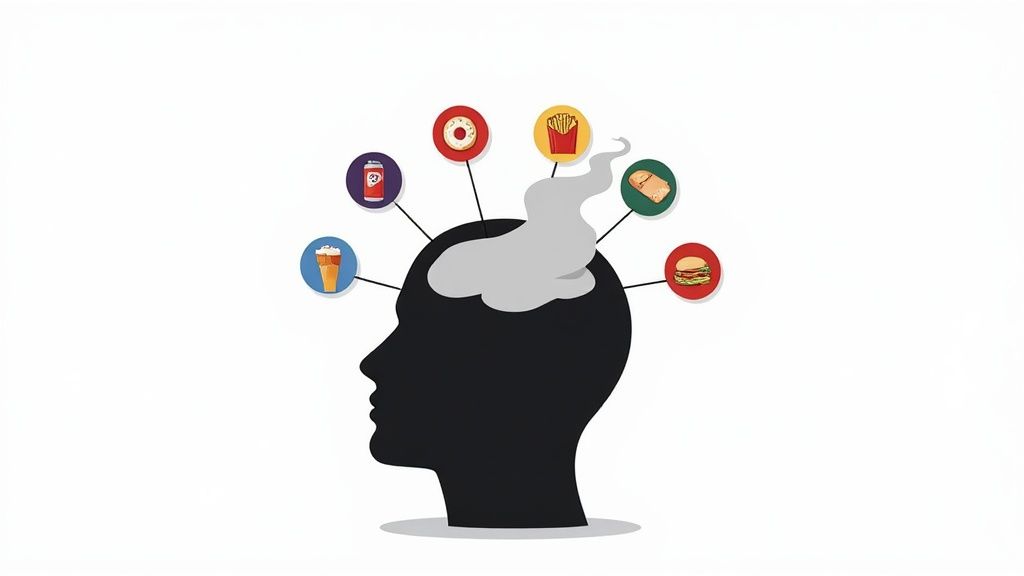
That hazy, unfocused feeling known as brain fog isn't just a sign of a long day or lack of sleep. It's often a direct signal from your brain about the food you’re eating. The connection between diet and cognitive function is incredibly strong, with specific ingredients contributing to the inflammation, energy crashes, and neurotransmitter imbalances that leave you feeling sluggish and mentally stuck. Many common pantry staples are among the primary foods that cause brain fog, directly impacting your ability to think clearly and perform at your best.
This guide gets straight to the point, identifying the eight most common dietary culprits behind mental fatigue. We will break down exactly how these foods disrupt your brain's delicate chemistry, from spiking blood sugar to promoting oxidative stress. More importantly, you will get simple, actionable strategies to replace them with brain-boosting alternatives. By understanding which foods to limit or avoid, you can take the first crucial step toward sharper focus, better memory, and sustained cognitive energy throughout your day. Let's dive into the list and start clearing the mental clouds for good.
1. Refined Carbohydrates and Sugary Foods
That mid-afternoon slump where your thoughts feel fuzzy and your energy plummets? It might be linked to your lunch. Refined carbohydrates and sugary foods are notorious for being some of the primary foods that cause brain fog, sending your cognitive function on a rollercoaster.
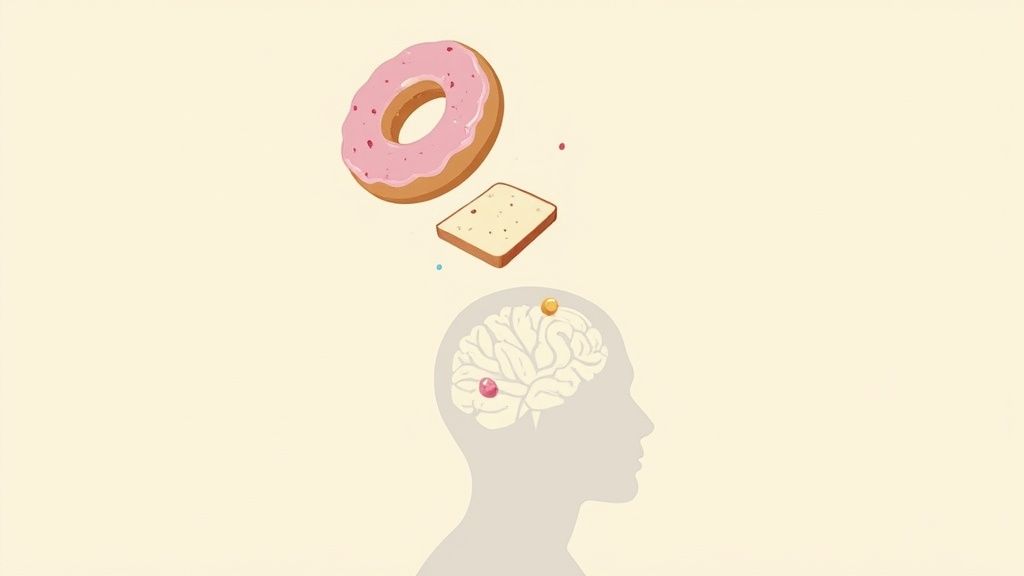
These foods, like white bread, pastries, soda, and sugary cereals, are stripped of fiber and nutrients during processing. This allows your body to digest them very quickly, causing a rapid spike in blood sugar. Your brain gets a brief, intense burst of glucose, but what goes up must come down. The subsequent crash leaves your brain starved for its primary fuel source, leading to fatigue, irritability, and that all-too-familiar mental haze. This unstable energy supply directly impairs your ability to concentrate and recall information.
Why It Causes Brain Fog
Your brain depends on a steady supply of glucose to function optimally. The sharp peaks and valleys in blood sugar caused by refined carbs disrupt this delicate balance. Think of it like trying to run a high-performance engine on inconsistent, low-quality fuel. It sputters, stalls, and can't perform at its peak. This instability is a key reason why these processed items are considered top foods that cause brain fog.
Actionable Tips to Avoid the Crash
Making smarter choices can help you maintain stable energy and clear focus throughout the day.
- Swap for Whole Grains: Replace white bread, pasta, and rice with 100% whole-wheat or whole-grain alternatives. These contain fiber that slows down sugar absorption.
- Balance Your Plate: Never eat carbohydrates alone. Pair them with a source of protein and healthy fat (like chicken breast with quinoa or an apple with almond butter) to stabilize your blood sugar.
- Practice the '2-Hour Rule': Avoid consuming refined carbs or sugary snacks for at least two hours before an important meeting or task that requires intense focus.
- Read the Labels: Check for "added sugars" on nutrition labels and aim for less than 5 grams per serving. You can learn more about how different foods impact your blood sugar by understanding the Glycemic Index.
2. Trans Fats and Hydrogenated Oils
Those convenient packaged snacks and fried fast foods might be doing more than just affecting your waistline. They are often loaded with artificial trans fats and hydrogenated oils, which are among the most detrimental foods that cause brain fog by directly damaging your brain's cellular structure.
These artificial fats are created by adding hydrogen to vegetable oil, a process that makes the oil more solid and less likely to spoil. This extends the shelf life of products like margarine, fried foods, and commercial baked goods. However, their rigid structure damages the flexible membranes of your brain cells, impairing neuronal communication and promoting inflammation. This disruption can lead to slower mental processing, memory issues, and a persistent state of mental fog.
Why It Causes Brain Fog
Your brain is composed of nearly 60% fat, and the type of fat you consume directly builds your brain cells. When you eat trans fats, your body incorporates these stiff, unnatural fats into your neuronal membranes. This harms the cell's ability to send and receive signals effectively, essentially slowing down your brain's "internet speed." The resulting inflammation also adds to cognitive stress, solidifying their reputation as top foods that cause brain fog.
Actionable Tips to Avoid the Damage
Protecting your brain from these harmful fats requires a bit of diligence, especially when it comes to processed foods.
- Read the Ingredients: Always check the ingredient list for "partially hydrogenated oil." This is the primary source of artificial trans fats.
- Be Wary of '0g Trans Fat' Claims: Regulations allow products to be labeled "0g trans fats" if they contain less than 0.5 grams per serving. If you see partially hydrogenated oil listed, the product still contains them. You can learn more about how to spot hidden ingredients by understanding how to read nutrition labels.
- Choose Healthier Fats: Swap margarine for real butter, ghee, or high-quality oils like olive or coconut oil for cooking.
- Cook at Home: The best way to control your fat intake is to prepare your own meals. This helps you avoid the hydrogenated oils commonly used for frying in restaurants and fast-food chains.
3. Artificial Sweeteners and Sugar Alcohols
Reaching for that "diet" soda or "sugar-free" treat to avoid a sugar crash might seem like a smart move, but it could be counterproductive for your mental clarity. Artificial sweeteners and sugar alcohols are often hidden culprits in the list of foods that cause brain fog, disrupting your body's delicate systems in ways that directly impact cognition.
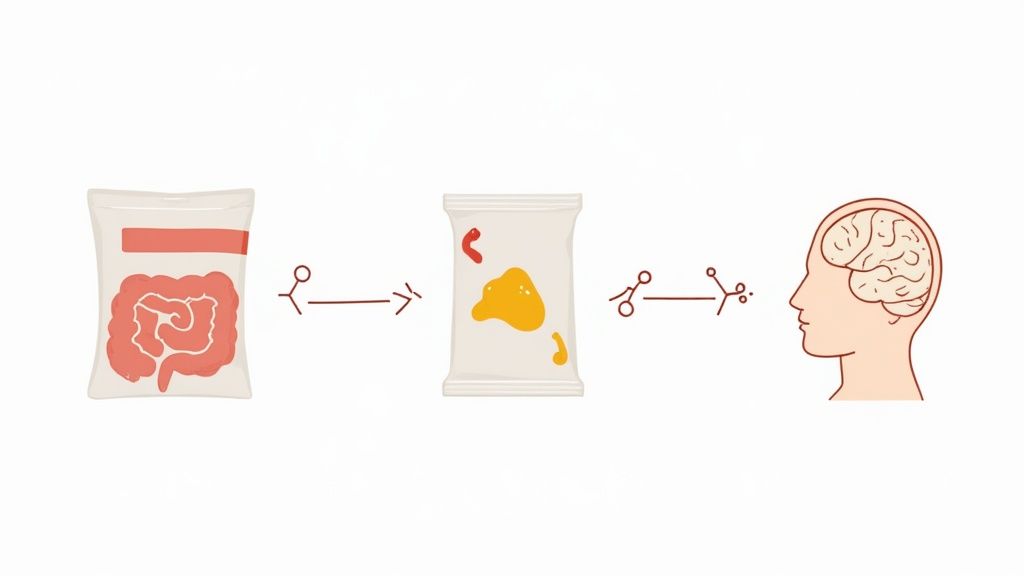
These sugar substitutes, found in products like diet yogurts, sugar-free gum, and artificially sweetened beverages, are designed to trick your taste buds without providing calories. However, compounds like aspartame, sucralose, erythritol, and xylitol can disrupt your gut microbiome, which is directly connected to your brain via the gut-brain axis. This disruption can interfere with the production of crucial neurotransmitters like serotonin, leading to headaches, mood swings, and significant brain fog.
Why It Causes Brain Fog
Unlike natural sugar, certain artificial sweeteners can cross the blood-brain barrier and potentially interfere with brain function and neurotransmitter pathways. This chemical interference can trigger neurological symptoms, making it difficult to concentrate or think clearly. Furthermore, the negative impact on gut bacteria is a key reason these additives are considered top foods that cause brain fog. A healthy gut is essential for a sharp mind, and when that balance is thrown off, cognitive performance often suffers.
Actionable Tips to Avoid the Crash
Making mindful choices about sweeteners can help protect your mental sharpness and avoid cognitive side effects.
- Swap for Natural Alternatives: If you need a touch of sweetness, opt for natural, zero-calorie options like pure stevia or monk fruit in moderation.
- Prioritize Whole Foods: The easiest way to avoid these additives is to focus on whole, unprocessed foods. Choose a piece of fruit over a "sugar-free" candy or yogurt.
- Read the Labels Carefully: Get familiar with the names of common artificial sweeteners (aspartame, sucralose, acesulfame K) and sugar alcohols (erythritol, xylitol, sorbitol) to spot them in ingredient lists. You can dive deeper and learn more about the health risks of artificial sweeteners.
- Monitor Your Symptoms: Pay attention to how you feel after consuming products with these sweeteners. If you notice a headache or mental fogginess, it might be a sign to cut them out.
4. Gluten and Wheat Products
For many people, the seemingly harmless sandwich or bowl of pasta could be the hidden culprit behind their persistent mental haze. Gluten, a protein found in wheat, barley, and rye, is increasingly recognized as one of the significant foods that cause brain fog, particularly for individuals with sensitivity.
In those with celiac disease or non-celiac gluten sensitivity (NCGS), consuming gluten triggers an inflammatory response in the gut. This inflammation can damage the intestinal lining, leading to a condition known as "leaky gut," where particles can enter the bloodstream. This process doesn't stop at the gut; it can compromise the blood-brain barrier, allowing inflammatory molecules to enter the brain. This neuroinflammation directly contributes to cognitive symptoms like brain fog, difficulty concentrating, and memory issues.
Why It Causes Brain Fog
The link between gluten and the brain is often tied to the gut-brain axis, the communication network connecting your digestive system and central nervous system. When the gut is inflamed due to gluten, it sends stress signals to the brain. This can disrupt the production of neurotransmitters and increase oxidative stress, impairing your brain's ability to function clearly and efficiently. Even without a full-blown celiac diagnosis, this underlying inflammation makes gluten one of the sneakiest foods that cause brain fog.
Actionable Tips to Avoid the Fog
If you suspect gluten might be affecting your cognitive clarity, here are some practical steps you can take.
- Try an Elimination Trial: Remove all gluten-containing foods from your diet for at least 30 days. Carefully observe your mental clarity and energy levels, then reintroduce gluten to see if symptoms return.
- Become a Label Detective: Gluten hides in many processed foods, including sauces, soups, and dressings. Diligently read labels for terms like "wheat," "barley," "rye," and "malt."
- Explore Gluten-Free Grains: Replace wheat-based products with naturally gluten-free alternatives like quinoa, rice, corn, and buckwheat to maintain a balanced diet.
- Keep a Food and Symptom Diary: Track what you eat and how you feel each day. This can help you clearly correlate gluten intake with episodes of brain fog and pinpoint your sensitivity.
5. High Mercury Fish and Seafood
While fish is often praised as brain food, certain types can have the opposite effect. Large, predatory fish that live longer can accumulate high levels of mercury, a heavy metal and potent neurotoxin, making them surprising culprits on the list of foods that cause brain fog.
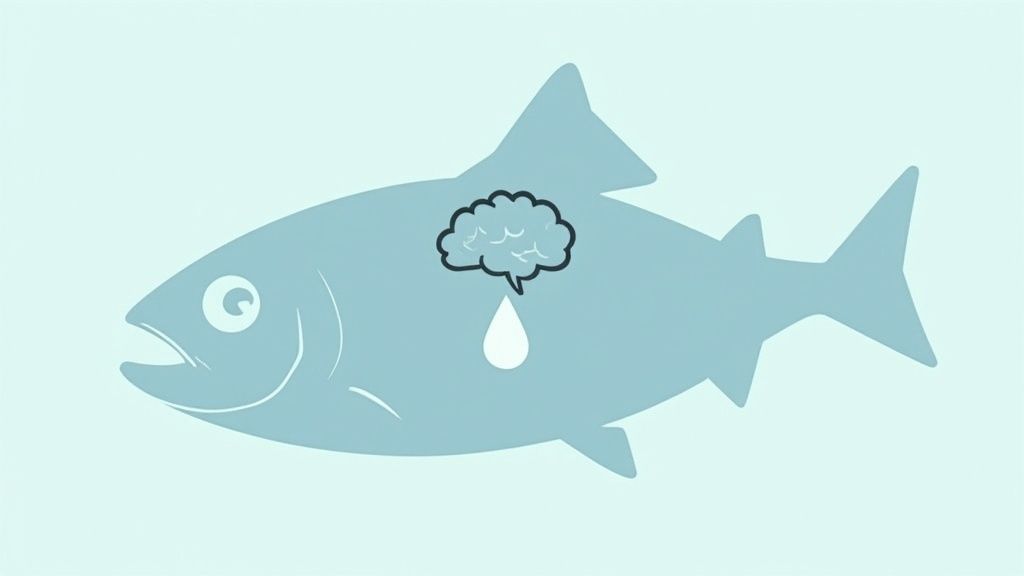
When you consume these fish, mercury can cross the blood-brain barrier and wreak havoc on your central nervous system. It interferes with mitochondrial function, disrupts neurotransmitter signaling, and causes oxidative stress, leading to neuronal damage. Even at low levels of accumulation, this can manifest as memory problems, difficulty concentrating, and a persistent feeling of mental slowness. Examples of high-mercury fish include shark, swordfish, king mackerel, tilefish, and bigeye tuna.
Why It Causes Brain Fog
Your brain's intricate signaling network is highly sensitive to toxins. Mercury directly damages nerve cells and disrupts the delicate balance of neurotransmitters responsible for mood, focus, and memory. This neurological interference is like static on a radio signal; the messages your brain cells are trying to send and receive become distorted or lost. This direct toxic effect is why high-mercury seafood is a significant food that causes brain fog and cognitive decline over time.
Actionable Tips to Avoid the Crash
You can still enjoy the benefits of seafood by making informed choices to minimize mercury exposure.
- Choose Low-Mercury Options: Prioritize smaller, non-predatory fish like salmon, sardines, anchovies, and herring. These are rich in omega-3s but low in mercury.
- Limit High-Risk Fish: If you eat high-mercury fish like swordfish or bigeye tuna, limit consumption to no more than once or twice per month.
- Rotate Your Choices: Avoid eating the same type of fish repeatedly. By varying your seafood intake, you reduce the risk of accumulating toxins from a single source.
- Check Advisories: The FDA and EPA provide guidelines and local advisories on fish consumption, which are especially critical for pregnant women and children. You can learn more about specific recommendations on the FDA's website.
6. Excess Caffeine and Energy Drinks
That morning cup of coffee can feel essential for clearing the cobwebs, but too much of a good thing can backfire. While moderate caffeine is a known cognitive enhancer, excessive consumption of coffee, energy drinks, and other stimulants are common foods that cause brain fog by disrupting your natural energy and sleep cycles.
Consuming high amounts of caffeine, especially from sugary energy drinks, creates a cycle of artificial alertness followed by a significant crash. Caffeine works by blocking adenosine receptors in your brain, which are responsible for signaling sleepiness. Overriding this system can lead to jitteriness and anxiety, but the real problem comes later. When the caffeine wears off, the built-up adenosine floods your system, leading to an overwhelming feeling of fatigue and a clouded mind. This roller coaster of hyperarousal and exhaustion severely impacts your ability to maintain focus and think clearly.
Why It Causes Brain Fog
Your brain's ability to rest and reset is crucial for sharp cognitive function. Excessive caffeine intake directly sabotages this process, especially by disrupting sleep quality. Even if you manage to fall asleep, the deep, restorative stages are often compromised. This leads to waking up feeling groggy and unrefreshed, creating a vicious cycle where you reach for even more caffeine to combat the fatigue, further worsening the problem. This cumulative sleep debt is a major reason why high caffeine intake is one of the top foods that cause brain fog.
Actionable Tips to Avoid the Crash
Mindful caffeine consumption can help you harness its benefits without the cognitive downside.
- Set a Daily Limit: Stick to the Mayo Clinic's recommendation of no more than 400mg of caffeine per day, which is about four cups of brewed coffee.
- Implement a Caffeine Curfew: Avoid all caffeine after 2 PM to protect your natural sleep-wake cycle and ensure deep, restorative sleep.
- Hydrate Strategically: Dehydration can worsen brain fog, and caffeine is a mild diuretic. For every caffeinated beverage you drink, have a glass of water.
- Taper Off Slowly: If you're cutting back, do it gradually to avoid withdrawal symptoms like headaches and irritability. For coffee lovers, learning how to decaffeinate coffee at home can be a helpful strategy to reduce intake without giving up the ritual.
- Switch to Green Tea: Consider replacing a cup of coffee with green tea. It contains less caffeine and also has L-theanine, an amino acid that promotes calm alertness.
7. Vegetable Oils and Omega-6 Polyunsaturated Fats
The cooking oils and salad dressings in your pantry might be silently contributing to your mental haze. Common refined vegetable oils are loaded with omega-6 polyunsaturated fats, which can promote inflammation when out of balance with anti-inflammatory omega-3 fats, making them significant foods that cause brain fog.
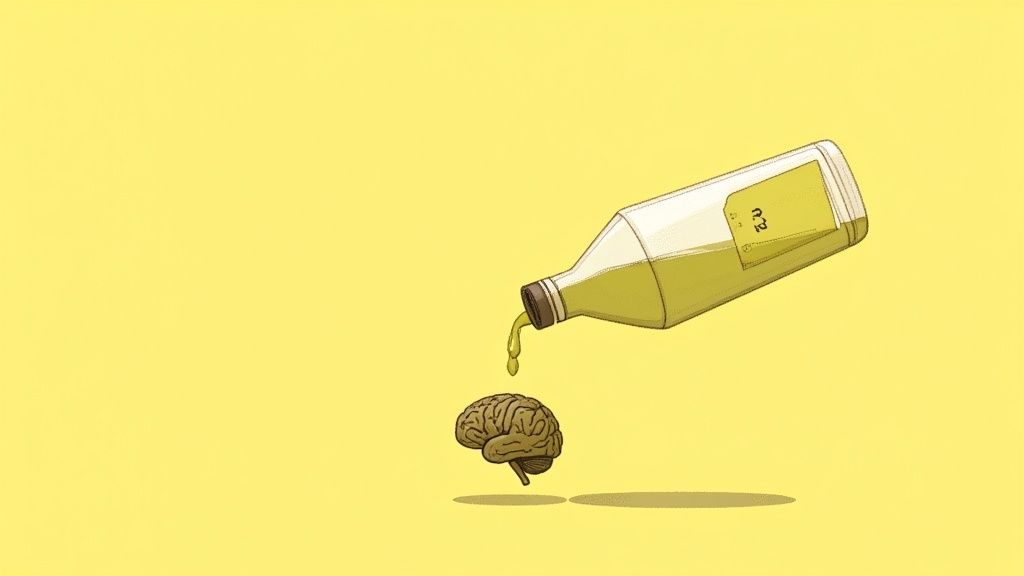
These oils, including soybean, canola, corn, and sunflower oil, are ubiquitous in processed foods, restaurant meals, and commercial baked goods. An excessive intake of omega-6 fatty acids triggers an inflammatory cascade throughout the body, including the brain. This neuroinflammation can damage brain cells, disrupt protective myelin sheaths, and impair communication between neurons, leading to that feeling of mental sluggishness and cognitive decline.
Why It Causes Brain Fog
Your brain's health depends on a delicate balance between omega-6 and omega-3 fatty acids. The modern diet has skewed this ratio dramatically in favor of pro-inflammatory omega-6s, often as high as 20:1 instead of the ideal 4:1 or lower. This chronic, low-grade neuroinflammation is like a constant state of alert for your brain's immune system. It creates a hostile environment that hinders optimal cognitive processes, making these oils primary culprits among foods that cause brain fog.
Actionable Tips to Avoid the Crash
Rebalancing your fatty acid intake is crucial for clearing the fog and protecting long-term brain health.
- Choose Stable Cooking Fats: Cook with olive oil for low heat, or use more stable options like coconut oil, avocado oil, ghee, or grass-fed butter for higher temperatures.
- Boost Your Omega-3s: Actively increase your intake of omega-3 rich foods like fatty fish (salmon, mackerel), flaxseeds, chia seeds, and walnuts to counteract inflammation.
- Read Ingredient Lists: Scrutinize labels on processed foods, dressings, and snacks. Avoid products listing "vegetable oil," soybean oil, or corn oil, especially near the top of the list.
- Make Your Own Dressings: Create simple, healthy salad dressings at home using a base of extra virgin olive oil and vinegar or lemon juice. This gives you complete control over the quality of fats.
8. Alcohol and Alcoholic Beverages
That groggy, slow-thinking feeling the day after even a single drink isn't just a sign of a mild hangover; it's a direct symptom of alcohol's impact on your brain. While often seen as a social relaxant, alcohol is a potent neurotoxin and one of the most significant contributors when it comes to foods that cause brain fog, directly impairing cognitive clarity and function.

Whether it's beer, wine, or spirits, alcohol consumption disrupts the delicate balance of neurotransmitters in your brain, slowing down communication between brain cells. It also dehydrates your body, and since the brain is about 75% water, even mild dehydration can shrink brain tissue, leading to headaches and impaired focus. This effect is compounded by alcohol's negative impact on sleep, as it prevents you from reaching the deep, restorative stages of sleep necessary for memory consolidation and mental clarity.
Why It Causes Brain Fog
Alcohol is a central nervous system depressant that directly interferes with brain function. It disrupts the communication pathways used by neurotransmitters like glutamate (responsible for brain activity) and GABA (which has a calming effect), creating an imbalance that leads to sluggish thinking. Furthermore, the metabolic byproducts of alcohol processing, such as acetaldehyde, are toxic to the brain. This chemical stress, combined with dehydration and poor sleep, creates the perfect storm for severe mental haze, making it a primary culprit among foods that cause brain fog.
Actionable Tips to Avoid the Crash
Protecting your cognitive function means being mindful of your alcohol intake.
- Stay Hydrated: For every alcoholic drink you consume, drink a full glass of water. This helps counteract the dehydrating effects that contribute to brain fog.
- Eat Before You Drink: Consuming a meal rich in protein and healthy fats before drinking alcohol can slow its absorption into your bloodstream, lessening its immediate impact on your brain.
- Avoid Binge Drinking: Space out your drinks and avoid consuming large quantities in a short period. Binge drinking is particularly damaging to brain cells and cognitive health.
- Protect Your Sleep: Stop drinking alcohol at least four hours before you plan to go to sleep. This gives your body time to metabolize it, minimizing its disruption to your restorative sleep cycles. You can learn more about how alcohol impacts your body from resources like the National Institute on Alcohol Abuse and Alcoholism.
Top 8 Brain-Fog Foods Compared
| Item | 🔄 Implementation Complexity | Resource Requirements | ⚡ Expected Short-term Effects | 📊 Long-term Impact ⭐ | 💡 Tips / Ideal Use Cases |
|---|---|---|---|---|---|
| Refined Carbohydrates and Sugary Foods | Low–Moderate 🔄: easy swaps but requires habit change | Low cost; widely available alternatives (whole grains, fruit) | Rapid glucose spike → crash; short energy then fatigue ⚡ | Blood sugar instability, insulin resistance, cognitive decline 📊 | Pair carbs with protein/fat; choose whole fruits; avoid before important tasks 💡 |
| Trans Fats and Hydrogenated Oils | Moderate–High 🔄: read labels, avoid many processed foods | Requires label vigilance; alternatives may cost more | No acute benefit; promote inflammation with repeated exposure ⚡ | Neuroinflammation, impaired neuronal membranes, increased dementia/CVD risk 📊⭐ | Avoid "partially hydrogenated"; use butter/coconut; cook at home 💡 |
| Artificial Sweeteners and Sugar Alcohols | Low–Moderate 🔄: replace diet products gradually | Low cost; monitor labels and personal symptoms | No glycemic spike; possible headaches, brain fog, GI symptoms in sensitive people ⚡ | Altered gut microbiome; potential metabolic and cognitive effects (emerging evidence) 📊 | Prefer whole foods; consider stevia/monk fruit; track symptoms when reducing 💡 |
| Gluten and Wheat Products | Moderate–High 🔄: elimination trial and strict avoidance for sensitive people | May increase food cost; needs label checks and cross‑contamination control | Can trigger brain fog in sensitive individuals; onset varies ⚡ | Autoimmune/neuroinflammatory reactions in susceptible people; persistent cognitive symptoms 📊 | Try 30‑day elimination trial; keep a food diary; use rice/quinoa substitutes 💡 |
| High Mercury Fish and Seafood | Low 🔄: choose species wisely and rotate consumption | Moderate effort to research species; low-to-moderate cost | Often no acute symptoms; subtle cognitive changes possible after exposure ⚡ | Mercury bioaccumulation → neurotoxicity, memory and concentration impairment 📊⭐ | Limit high‑mercury species; favor salmon/sardines; consult advisories; pregnant women avoid 💡 |
| Excess Caffeine and Energy Drinks | Low–Moderate 🔄: track and limit intake; adjust timing | Minimal cost; requires monitoring all sources | Increased alertness at moderate doses; excess → jitteriness, anxiety, crash, sleep disruption ⚡ | Chronic sleep disruption, dependency, daytime cognitive impairment 📊 | Limit to ~200–400 mg/day; avoid after 2 PM; hydrate; consider green tea with L‑theanine 💡 |
| Vegetable Oils and Omega-6 Polyunsaturated Fats | Moderate 🔄: swap oils and reduce processed foods | May cost more for olive/avocado oils; label vigilance needed | No acute cognitive benefit; excess contributes to pro‑inflammatory state ⚡ | High omega‑6:omega‑3 ratio → chronic neuroinflammation, oxidative stress, cognitive decline 📊⭐ | Use stable fats (olive, ghee); increase omega‑3s; avoid reheating vegetable oils 💡 |
| Alcohol and Alcoholic Beverages | Moderate 🔄: reduce or abstain; social factors complicate change | Low direct cost to change; may need support for heavy use | Impaired cognition, next‑day fog, disrupted sleep architecture ⚡ | Neurotoxicity, brain atrophy, increased dementia and long‑term cognitive decline 📊⭐ | Follow drinking guidelines; hydrate; avoid alcohol within 4 hours of bedtime; consider abstinence for optimal cognition 💡 |
Your Action Plan for a Fog-Free Future
Navigating the landscape of cognitive health can feel overwhelming, but clarity begins with conscious choices on your plate. We've explored how common culprits, from refined carbohydrates and trans fats to excess alcohol and artificial sweeteners, can cloud your thinking and sap your energy. The connection is clear: the foods that cause brain fog often work by triggering inflammation, disrupting blood sugar, or interfering with your brain's delicate chemistry.
The journey to a sharper mind isn't about achieving perfection overnight. It's about empowerment. It's about recognizing that what you eat directly impacts how you feel, think, and perform. By systematically identifying and replacing these cognitive disruptors, you are taking back control of your mental performance.
Your First Steps to Mental Clarity
Feeling motivated? Don't try to change everything at once. Small, consistent actions build unstoppable momentum. Here’s a simple, actionable plan to get you started:
- Pick One Battle: Choose just one category from this list to focus on for the next two weeks. Perhaps you’ll swap your daily sugary soda for sparkling water or replace processed vegetable oils with olive or avocado oil for cooking.
- Observe and Record: Pay close attention to how you feel. Note any changes in your energy levels, focus, and overall mood. To effectively pinpoint triggers, consider using the best food diary app for easy nutrition tracking to connect what you eat with how you feel. This data is your personal roadmap to a fog-free life.
- Upgrade, Don't Deprive: Instead of focusing on what you're removing, concentrate on what you're adding. Enjoy antioxidant-rich berries, brain-boosting omega-3s from wild salmon, and the steady energy from complex carbohydrates like quinoa and sweet potatoes.
Building Lasting Cognitive Resilience
Eliminating foods that cause brain fog is more than a diet; it's a profound act of self-care that builds cognitive resilience. When you consistently nourish your brain with whole, unprocessed foods, you're not just clearing away the fog. You are constructing a foundation for sustained focus, better memory, and a more stable mood. You're equipping yourself to handle stress more effectively and show up as your best self at work, at home, and in everything you do.
Think of each meal as an opportunity. It's a chance to fuel your brain for success or to unintentionally hold it back. The path to a clearer mind truly begins with your next plate. Choose wisely, be patient with yourself, and embrace the powerful clarity that awaits. You have the knowledge and the tools; now it’s time to take the first step.